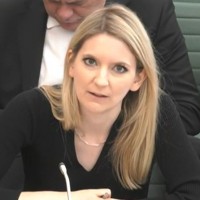 Media minister Julia Lopez has vowed to take the BBC to task over its plan to create 131 new local news jobs while cutting 179 other roles.
Media minister Julia Lopez has vowed to take the BBC to task over its plan to create 131 new local news jobs while cutting 179 other roles.
Mrs Lopez says she will be having an “open and honest discussion” with the BBC’s director-general Tim Davie when she meets him next week after hearing concerns about the plan from MPs from across the political spectrum.
The corporation announced on Monday it is creating 11 investigative reporting teams across the country while, in a separate move, increasing its daily online news provision for 43 local areas and launching dedicated websites covering Bradford, Wolverhampton, Sunderland and Peterborough.
The scheme is part of a series of changes which will see 179 other roles being made redundant due to the introduction of increased programme-sharing across its network of 39 local radio stations in England, as well as documentary series We are England coming to an end.
Addressing an urgent question on the proposals from Emma Hardy, Labour MP for Kingston upon Hull West and Hessle, Mrs Lopez told the House of Commons: “Changes in patterns of listening mean that the BBC needs to look at its services, and the details about new investment in local investigative reporting are very welcome. But overall we do have concerns about the proposals, which we were not given notice of.
“I want to take this opportunity to stress that the BBC is rightly operationally and editorially independent from the Government, and that decisions on service delivery are ultimately a matter for it. However, the Government are disappointed that the BBC is reportedly planning to make such extensive cuts to its local radio output.
“We await to hear more from the BBC about how it expects those changes to impact local communities, including in respect of the provision of local news and media plurality.
“We recognise that in the current political context the BBC, like other organisations, is facing difficult financial decisions, but we are also concerned that the BBC is making such far-reaching decisions, particularly about its local news provision, without setting out further detail on how it will impact its audiences and the communities it serves.”
Under the plans, all 39 BBC stations will continue with their own dedicated local programming from 6am to 2pm on weekdays, but this will be cut to 18 shared programmes between 2pm and 6pm.
From 6pm to 10pm, there will be 10 shared programmes across the stations, broadly mirroring the areas served by the BBC’s television news regions – a model that will also be replicated all day on Saturdays and on Sunday mornings.
A national ‘all-England’ programme will also be launched after 10pm across the week and on Sunday afternoons and evenings.
However, the BBC has confirmed local news bulletin services will be protected across the day on all local stations and all live sports programming will be maintained.
Other MPs to take part in the Commons debate also raised concerns about the plans.
Derek Twigg, Labour MP for Halton, said the BBC should be “concentrating on investing more and on improving further the local content of radio stations, while Winchester’s Conservative MP described the planned cuts as a “decimation” of the BBC’s local radio services.
And former Culture Secretary Sir John Whittingdale, Tory MP for Maldon, said: “Online news is already well supplied by the local media, which is under considerable pressure even without greater competition from the BBC.”
Regional press industry leaders have also accused the BBC of trying to “directly compete” with the regional press over a plan to create the new local news jobs
Labour’s shadow media minister Stephanie Peacock said the planned reduction in local radio services had come about after the BBC had been “destabillised” by the government’s threat to scrap the licence fee.
She said: “The consequences of that instability are now showing. The journalists on the ground, doing their job, have had to find out through the media that their jobs are at risk of redundancy.”
In response, Mrs Lopez said: “We recognise that the BBC is under pressure, as are many other media organisations, which is why we have a series of reforms that we hope to put through in the media Bill to help it with some of those pressures.
“However, I say to the honourable lady that the BBC has a £3.8 billion annual income from the licence fee, and it has that income guaranteed for the next five years. Any media organisation would be grateful to have such stability in its funding settlement. I do not see that as destabilising.”
Rhodri Talfan Davies, director of BBC Nations, said: “These proposals aim to maintain the distinctiveness of our local services while allowing the BBC to adapt with our audiences and ensure we remain relevant.
“Taken together they will ensure our network of local services – across TV, radio, online and Sounds – offer more value for audiences.
“BBC Local Radio remains an essential service for millions of listeners – the very best local radio network in the world – but it’s also essential we make difficult choices that will enable us to reach out to many people that increasingly rely on their mobiles for local content.”





 Follow HTFP on Twitter
Follow HTFP on Twitter